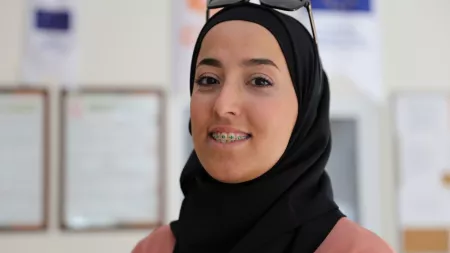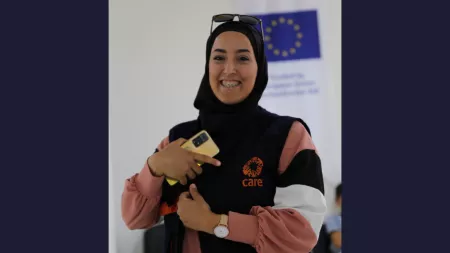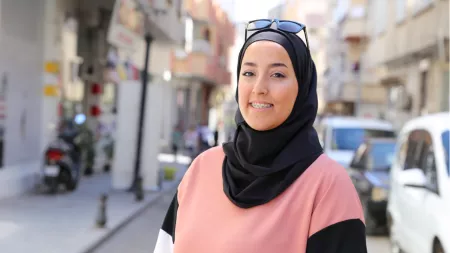Aya, 26, mother of two, is from Aleppo, Syria. She fled to Türkiye in 2011. Since 2021 she has been trained by CARE as a community activator in an Information Protection Space funded by the European Union. The following is a testimony of her experiences in Syria, Türkiye and during the earthquakes.
“I waited for five years to tell my story and for someone to listen to me,” says Aya.
We were visiting relatives in Idlib, Syria, in 2011, when the airstrikes hit. I never witnessed war before. The war had not reached Aleppo yet. The locals all knew what they needed to do and took shelter, but my family was just panicking. My brother went outside to see what was happening. When I looked out of the window, the only thing I saw was my brother covered in blood. I ran outside and held him crying. It felt so surreal and like I was in a nightmare.
When the rescue team came, they told us, that they were not able to help him as he had shrapnel in his brain. They needed to take him to a better-equipped hospital. So, we went with him. We were not prepared to go to Türkiye and did not know that we were crossing over the border. We just wanted to go wherever he could get the treatment he needed and then return home to Aleppo. And home to my husband, who did not know what had happened or where I went. My brother was eighteen years old and one year older than me.
When he woke up in the Turkish hospital, he did not remember me. He was screaming and kicked us out of the room. I just stood there and tried to reawaken a memory. Just one. He was a lifeguard at a swimming pool, and he taught me how to swim. But he could not remember, he didn’t even recognize me. Only slowly after a few days, he started to know who we are again. But the memory of his life before the airstrike never returned. He died three years later. He fell into a coma, and the doctors told us to unplug him, because there was no more hope.

“Is it really you?”
We didn’t have time to take anything with us and had no place to sleep. For four months we sometimes slept at the hospital, but most of the time we slept on park benches outside under the open sky. A nice Turkish lady came one day, gave us clothes and a place to stay. We didn’t plan to stay in Türkiye, but the war in my home progressed and Aleppo was affected. So, we were stuck. That was when I learnt that I was pregnant. It was very hard for me, and I didn’t want the baby to have my miserable life.
My husband was somewhere in Syria, and I didn’t even know if he was still alive. I searched for him online every single day. I tried to contact him on Facebook, but my messages didn’t even go through to him, because there was no internet or phone coverage in Syria at that time. I cried every day and still cry when I remember that time we were separated. It took me seven months to find him. I texted him over and over again, checking for a response many times every day. The first thing he wrote back was, “Is it really you? Are you okay?” And I broke down in tears. We then had a voice call and I told him that I was in Türkiye and seven months pregnant.
For one year he tried to join me in Türkiye. Four times he tried to cross the border. The last time he hid under some sugar bags in the back of a truck. It was the happiest day in my life when we reunited. I travelled for three hours to the border with Sila, our newborn. Then I was finally able to wrap my arms around him. He asked me, “Is this Sila?”, took her in his arms and did not let go of her until we reached his new home in Türkiye. Together we built a life here and had our son Qusay, who is five today.
"When I am raising the awareness of a mother or anyone else, this will raise the awareness of their children,"Aya says.
Working as a CARE community activator
Two years ago, a friend told me about CARE. At that time, I really wanted to work with children or in child protection. As a mother it is really important to me to keep our children safe. Working with CARE as a community activator has developed me and I understand so much more now. I participate in a CARE women’s club where we discuss about many different topics such as early marriage. I myself prevented two cases of child marriage in my neighborhood which I am very proud of.
One was a 16-year-old girl. I approached her when I heard that she was going to marry, and she told me that she did not want to. Then I went to her mother and told her that she is risking her child’s health and life. That girl might die if she gets pregnant too early, so the mother cancelled the wedding. The girl hugged me as a thank you and I felt so good at that moment. I also married too young. With CARE I learnt about what this means for my health. I did not have this information before, and it was not good to be a mother at 17. When I advise others I always start with my own experience. But thankfully, my marriage is a happy one, but that is not always the case.
I feel that being a CARE community activator I can be something in the society. I want to change something for the better.

It was all happening again
Then the earthquake hit us. It was early in the morning. First, I thought it would be short like always. We are used to earthquakes here. But this time it was too long. It was shaking so strong, and it was so dark as there was no electricity. People were screaming everywhere. Our apartment was on the 5th floor, and it took us nearly ten minutes to get out. It was so difficult as there was so much destruction and stones falling from the ceiling. In the staircase I saw an old woman stuck under a wall. I don’t know where I got the strength to lift that wall to get her out, but I did. My now nine-year-old daughter Sila was too scared to go outside in the beginning. She was shocked and traumatized. She just kept on saying, “I know, I know,” and nodding her head for at least ten minutes. We didn’t understand what she was doing.
For the first four days after the earthquakes, we slept in a mosque on the floor. We received food and blankets, but there were too many people and we often stood at the end of the line, and nothing was left for us. After that we slept on a park bench under the open sky again, just like when we fled Syria. It was all happening again. When we returned to our apartment three weeks later, nearly everything was stolen. Every electronic device from our TV to the fridge were gone.
I lost my home in Syria and then I lost my home in Türkiye. It was absolutely devastating for us. However, I am grateful. We survived. We are together. And with CARE I can do something with meaning. Shaping society with what I have learnt and experienced for a better future.
